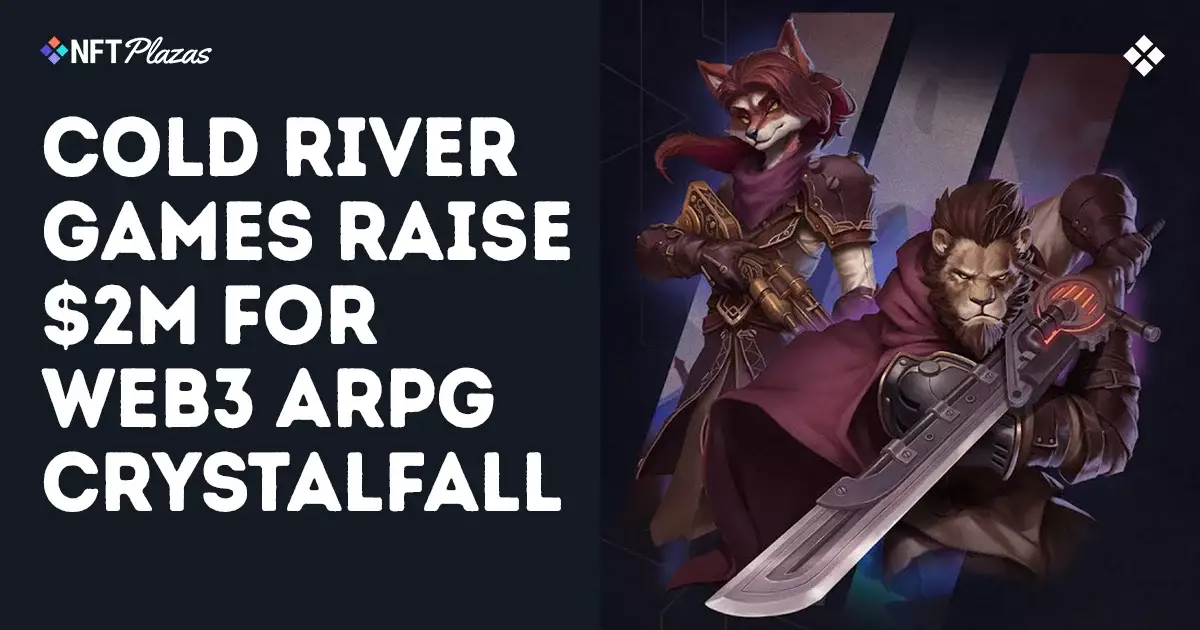In recent years, the gaming industry has seen an influx of blockchain-based projects promising revolutionary changes. Titles like Crystalfall emerge as shining examples of this trend, positioning themselves as the future guardians of a new kind of gaming economy. With a hefty $2 million injection from investors such as Avalanche and Beam Investments, Cold River Games’s ambitious project seems poised for greatness. The company’s choice to integrate blockchain technology into an old-school ARPG, set in a gritty post-apocalyptic steampunk universe, signals a desire to blend nostalgia with cutting-edge innovation. Cold River’s veteran team from illustrious titles like Path of Exile and Pillars of Eternity further fuels expectations, leading many to view Crystalfall as a potential game-changer.
However, beneath this veneer of optimism lies a troubling reality. While the industry is eager to tout blockchain as the future of gaming, it’s important to scrutinize whether these claims hold substantive value or are simply a bandwagon playing on current investor hype. The fascination with blockchain mechanics—particularly in the context of loot, barter economies, and player currencies—may be more aspirational than functional. This romanticization fails to account for the core challenge: whether players genuinely want blockchain’s complexities or if it’s merely a superficial gimmick.
The Illusion of Security and Sustainability
One of Cold River’s claims is the importance of maintaining a secure economy, which blockchain is purportedly designed to facilitate. But this is a fundamental misunderstanding of both gaming economies and blockchain’s real-world implications. Security in a game economy does not stem solely from the presence of blockchain but from tested, balanced design and thoughtful regulation—elements that many blockchain projects experience neglecting as they chase innovation.
Furthermore, the assertion that blockchain enhances barter economies in Action RPGs seems overly optimistic. Most players simply do not care about tokenized assets unless these mechanics add tangible value, such as meaningful NFTs or provably scarce items that significantly impact gameplay. In reality, many blockchain integrations devolve quickly into issues of volatility, a lack of liquidity, and the risk of speculative abuse, which can alienate the very audience Crystalfall seeks to attract.
It’s not a stretch to argue that the enthusiasm surrounding blockchain-powered game economies is misaligned with the practical realities of sustained engagement. Many players prefer straightforward gameplay mechanics without the complications of managing digital wallets or fearing possible financial loss. While the development team touts a secure system, their reliance on Avalanche’s blockchain infrastructure adds layers of dependency on external systems that are not guaranteed to be stable or transparent in the long run.
The Market Hype and Its Flimsiness
Crystalfall’s fundraising success, within the current VC landscape, might seem like a sign of burgeoning mainstream acceptance. Yet, this success is more reflective of industry hype than genuine market demand. Venture capitalists continue throwing money at blockchain projects, driven less by proven viability and more by the fear of missing out or the allure of quick profits.
The game’s free-to-play model combined with blockchain features raises skepticism. Will players tolerate microtransactions and blockchain-based loot in a genre deeply rooted in classic RPG gameplay? While Cold River aims for an “old-school” experience, their reliance on modern blockchain mechanics risks alienating fans of traditional ARPGs who see cryptocurrency and NFTs as incompatible with their gaming values.
Moreover, the timing of this funding round seems opportunistic. As market sentiment shifts and investors become more cautious, projects like Crystalfall must justify their blockchain incorporation through tangible, sustainable benefits—not just speculative allure. The reality is that many blockchain-enabled games suffer from poor retention, low user engagement, and a disconnect between new mechanics and core gameplay satisfaction.
The Political and Cultural Context of Cryptocurrency Adoption in Gaming
The broader political and cultural environment casts a shadow over blockchain’s role in gaming. The crypto boom has become increasingly scrutinized amid regulatory crackdowns, environmental concerns, and accusations of market manipulation. These issues suggest that mainstream acceptance is far from secured, and the long-term sustainability of blockchain-based games is doubtful.
Aligned with a center-right liberal stance that values free enterprise, innovation, and technological progress, it’s essential to recognize that not all technological advancements are inherently beneficial. Bitcoin’s energy consumption, the proliferation of scams, and the speculative nature of crypto markets have cast doubt on blockchain’s claim to be a force for good in any industry, including gaming.
Investors and developers pushing these technology-driven projects often overlook the importance of player-centric development and the commercial viability of such features. If the market fails to adopt or reject blockchain mechanics en masse, then projects like Crystalfall risk becoming costly experiments rather than horizons of genuine progress.
The truth is, blockchain’s place in gaming remains an unproven experiment—one driven more by hype and investor greed than genuine utility. Cold River’s bold move to embed blockchain into a traditional ARPG may sound innovative, but it could ultimately be a costly misjudgment, a window dressing to attract funding rather than a transformative development that players truly want.


Leave a Reply